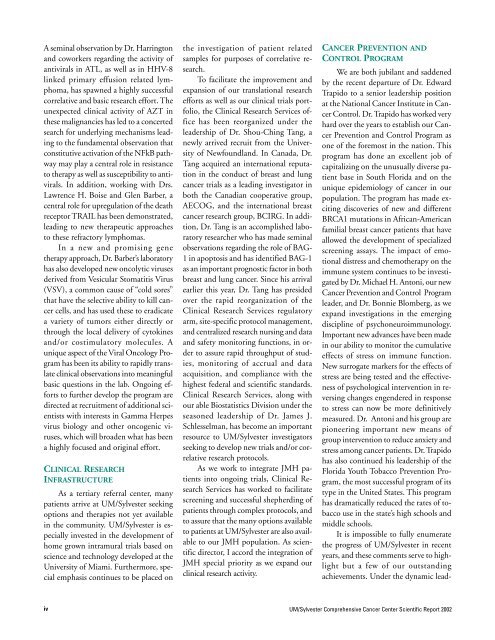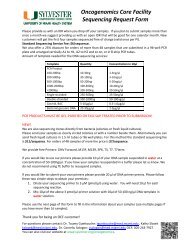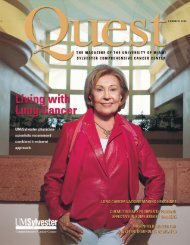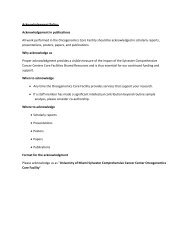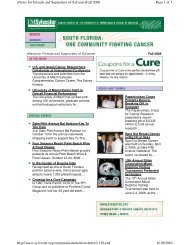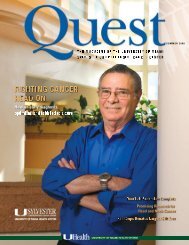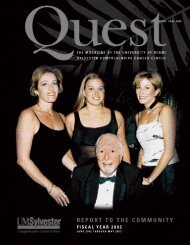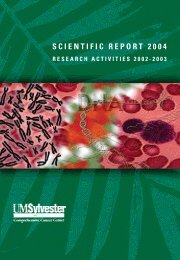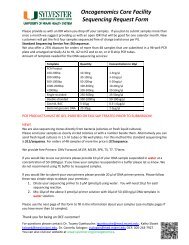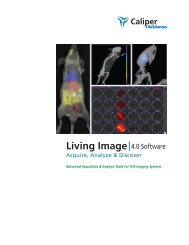tumor cell biology program - Sylvester Comprehensive Cancer Center
tumor cell biology program - Sylvester Comprehensive Cancer Center
tumor cell biology program - Sylvester Comprehensive Cancer Center
You also want an ePaper? Increase the reach of your titles
YUMPU automatically turns print PDFs into web optimized ePapers that Google loves.
A seminal observation by Dr. Harrington<br />
and coworkers regarding the activity of<br />
antivirals in ATL, as well as in HHV-8<br />
linked primary effusion related lymphoma,<br />
has spawned a highly successful<br />
correlative and basic research effort. The<br />
unexpected clinical activity of AZT in<br />
these malignancies has led to a concerted<br />
search for underlying mechanisms leading<br />
to the fundamental observation that<br />
constitutive activation of the NFkB pathway<br />
may play a central role in resistance<br />
to therapy as well as susceptibility to antivirals.<br />
In addition, working with Drs.<br />
Lawrence H. Boise and Glen Barber, a<br />
central role for upregulation of the death<br />
receptor TRAIL has been demonstrated,<br />
leading to new therapeutic approaches<br />
to these refractory lymphomas.<br />
In a new and promising gene<br />
therapy approach, Dr. Barber’s laboratory<br />
has also developed new oncolytic viruses<br />
derived from Vesicular Stomatitis Virus<br />
(VSV), a common cause of “cold sores”<br />
that have the selective ability to kill cancer<br />
<strong>cell</strong>s, and has used these to eradicate<br />
a variety of <strong>tumor</strong>s either directly or<br />
through the local delivery of cytokines<br />
and/or costimulatory molecules. A<br />
unique aspect of the Viral Oncology Program<br />
has been its ability to rapidly translate<br />
clinical observations into meaningful<br />
basic questions in the lab. Ongoing efforts<br />
to further develop the <strong>program</strong> are<br />
directed at recruitment of additional scientists<br />
with interests in Gamma Herpes<br />
virus <strong>biology</strong> and other oncogenic viruses,<br />
which will broaden what has been<br />
a highly focused and original effort.<br />
CLINICAL RESEARCH<br />
INFRASTRUCTURE<br />
As a tertiary referral center, many<br />
patients arrive at UM/<strong>Sylvester</strong> seeking<br />
options and therapies not yet available<br />
in the community. UM/<strong>Sylvester</strong> is especially<br />
invested in the development of<br />
home grown intramural trials based on<br />
science and technology developed at the<br />
University of Miami. Furthermore, special<br />
emphasis continues to be placed on<br />
the investigation of patient related<br />
samples for purposes of correlative research.<br />
To facilitate the improvement and<br />
expansion of our translational research<br />
efforts as well as our clinical trials portfolio,<br />
the Clinical Research Services office<br />
has been reorganized under the<br />
leadership of Dr. Shou-Ching Tang, a<br />
newly arrived recruit from the University<br />
of Newfoundland. In Canada, Dr.<br />
Tang acquired an international reputation<br />
in the conduct of breast and lung<br />
cancer trials as a leading investigator in<br />
both the Canadian cooperative group,<br />
AECOG, and the international breast<br />
cancer research group, BCIRG. In addition,<br />
Dr. Tang is an accomplished laboratory<br />
researcher who has made seminal<br />
observations regarding the role of BAG-<br />
1 in apoptosis and has identified BAG-1<br />
as an important prognostic factor in both<br />
breast and lung cancer. Since his arrival<br />
earlier this year, Dr. Tang has presided<br />
over the rapid reorganization of the<br />
Clinical Research Services regulatory<br />
arm, site-specific protocol management,<br />
and centralized research nursing and data<br />
and safety monitoring functions, in order<br />
to assure rapid throughput of studies,<br />
monitoring of accrual and data<br />
acquisition, and compliance with the<br />
highest federal and scientific standards.<br />
Clinical Research Services, along with<br />
our able Biostatistics Division under the<br />
seasoned leadership of Dr. James J.<br />
Schlesselman, has become an important<br />
resource to UM/<strong>Sylvester</strong> investigators<br />
seeking to develop new trials and/or correlative<br />
research protocols.<br />
As we work to integrate JMH patients<br />
into ongoing trials, Clinical Research<br />
Services has worked to facilitate<br />
screening and successful shepherding of<br />
patients through complex protocols, and<br />
to assure that the many options available<br />
to patients at UM/<strong>Sylvester</strong> are also available<br />
to our JMH population. As scientific<br />
director, I accord the integration of<br />
JMH special priority as we expand our<br />
clinical research activity.<br />
CANCER PREVENTION AND<br />
CONTROL PROGRAM<br />
We are both jubilant and saddened<br />
by the recent departure of Dr. Edward<br />
Trapido to a senior leadership position<br />
at the National <strong>Cancer</strong> Institute in <strong>Cancer</strong><br />
Control. Dr. Trapido has worked very<br />
hard over the years to establish our <strong>Cancer</strong><br />
Prevention and Control Program as<br />
one of the foremost in the nation. This<br />
<strong>program</strong> has done an ex<strong>cell</strong>ent job of<br />
capitalizing on the unusually diverse patient<br />
base in South Florida and on the<br />
unique epidemiology of cancer in our<br />
population. The <strong>program</strong> has made exciting<br />
discoveries of new and different<br />
BRCA1 mutations in African-American<br />
familial breast cancer patients that have<br />
allowed the development of specialized<br />
screening assays. The impact of emotional<br />
distress and chemotherapy on the<br />
immune system continues to be investigated<br />
by Dr. Michael H. Antoni, our new<br />
<strong>Cancer</strong> Prevention and Control Program<br />
leader, and Dr. Bonnie Blomberg, as we<br />
expand investigations in the emerging<br />
discipline of psychoneuroimmunology.<br />
Important new advances have been made<br />
in our ability to monitor the cumulative<br />
effects of stress on immune function.<br />
New surrogate markers for the effects of<br />
stress are being tested and the effectiveness<br />
of psychological intervention in reversing<br />
changes engendered in response<br />
to stress can now be more definitively<br />
measured. Dr. Antoni and his group are<br />
pioneering important new means of<br />
group intervention to reduce anxiety and<br />
stress among cancer patients. Dr. Trapido<br />
has also continued his leadership of the<br />
Florida Youth Tobacco Prevention Program,<br />
the most successful <strong>program</strong> of its<br />
type in the United States. This <strong>program</strong><br />
has dramatically reduced the rates of tobacco<br />
use in the state’s high schools and<br />
middle schools.<br />
It is impossible to fully enumerate<br />
the progress of UM/<strong>Sylvester</strong> in recent<br />
years, and these comments serve to highlight<br />
but a few of our outstanding<br />
achievements. Under the dynamic leadiv<br />
UM/<strong>Sylvester</strong> <strong>Comprehensive</strong> <strong>Cancer</strong> <strong>Center</strong> Scientific Report 2002


